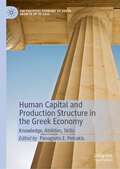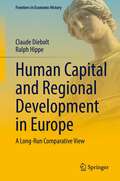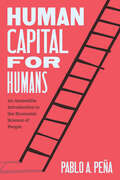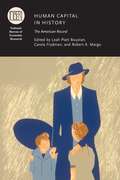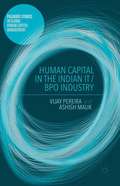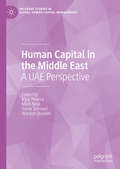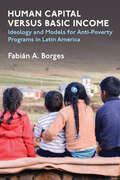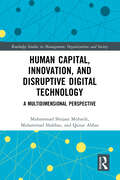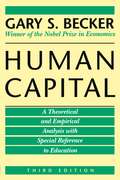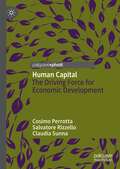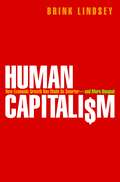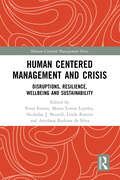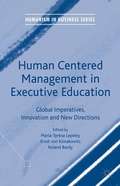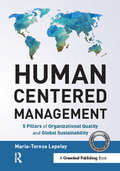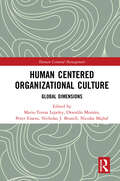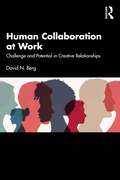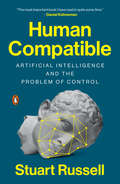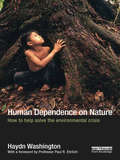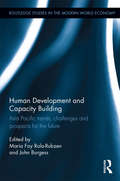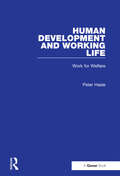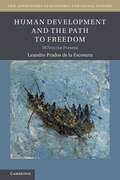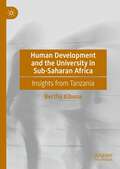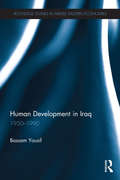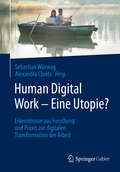- Table View
- List View
Human Capital and Production Structure in the Greek Economy: Knowledge, Abilities, Skills (The Political Economy of Greek Growth up to 2030)
by Panagiotis E. PetrakisThe role of human capital has diversified considerably in the last 100 years. Today, the prevailing perception seeks a sustainable, integrated development which is based on the triptych of environment, economy, and society. In this mode of development, human capital has a positive effect on the economy, on social cohesion and optimal governance, as well as on the ecological footprint.This book studies the critical role of human capital in the Greek economy and its production structure. In doing so, this book analyzes the Greek labor market, employment, and structural changes, among other facets of this vibrant economy.
Human Capital and Regional Development in Europe: A Long-Run Comparative View (Frontiers in Economic History)
by Claude Diebolt Ralph HippeHuman capital is of utmost importance for the future of our knowledge economies and societies. However, it is unequally distributed in Europe, contributing to marked spatial patterns of economic prosperity within and across countries. In many cases, these patterns have a long history. To understand them better, it requires to go back in time, when mass schooling was starting to become a reality across Europe. Taking a long-run perspective over more than 150 years, this book shows the development and the distribution of human capital in the regions of Europe and its connections with the economy. It provides insights into recent research findings in this area, including theoretical advances and the use of new empirical data.
Human Capital for Humans: An Accessible Introduction to the Economic Science of People
by Pablo A. PeñaAn accessible introduction to the most consequential science of modern life. University of Chicago economist Gary Becker won the Nobel Prize largely for his advancement of human capital theory—the idea that investing in a person’s knowledge and skills has a wide range of economic effects. Becker’s writing on the subject was technical, but his teaching, especially in his famous doctoral course at Chicago, remains legendary for its accessibility, brilliance, and applications to everyday life. In Human Capital for Humans, economist and former Becker student Pablo A. Peña channels this classroom approach to produce an accessible, essential guide to understanding the science that has become synonymous with modern life and the economy. With an illustrative and immersive style, Peña unpacks the human capital approach to domains such as parenting, aging, marriage, health, and household labor. The result is not only intellectually elevated, but an essential introduction for learners and teachers of this subject across business, management, economics, policy, and beyond.
Human Capital in History: The American Record (National Bureau of Economic Research Conference Report)
by Leah Platt Boustan Carola Frydman Robert A. MargoAmerica’s expansion to one of the richest nations in the world was partly due to a steady increase in labor productivity, which in turn depends upon the invention and deployment of new technologies and on investments in both human and physical capital. The accumulation of human capital#151;the knowledge and skill of workers#151;has featured prominently in American economic leadership over the past two centuries. Human Capital in History brings together contributions from leading researchers in economic history, labor economics, the economics of education, and related fields. Building on Claudia Goldin’s landmark research on the labor history of the United States, the authors consider the roles of education and technology in contributing to American economic growth and well-being, the experience of women in the workforce, and how trends in marriage and family affected broader economic outcomes. The volume provides important new insights on the forces that affect the accumulation of human capital.
Human Capital in the Indian IT/BPO Industry
by Vijay Pereira Ashish MalikHuman Capital in the Indian IT / BPO Industry analyses human capital management in the Indian information technology (IT) and business process outsourcing (BPO) industry, which has created a new paradigm for organising global talent engaged in designing and delivering IT and BPO services. The authors explore the evolution of the innovative talent management strategies of knowledge workers, which has received little attention in existing literature analysis. This book provides a rich theoretical grounding of managing human resources in the context of high-technology professional services firms, focusing on the design and implementation of high performance work system designs in the context of Indian IT/BPO organizations.
Human Capital in the Middle East: A UAE Perspective (Palgrave Studies in Global Human Capital Management)
by Mark Neal Vijay Pereira Yama Temouri Wardah QureshiProviding evidence of the role of human capital on innovation in the Middle East, this edited collection closely examines the unique nature of the workforce in this region. It highlights the challenges that the United Arab Emirates faces in becoming more globally competitive, with emphasis on its unique socio-cultural context and a rapidly changing institutional set up. Filling a growing need for research – particularly in the context of the UAE’s ambition to become one of the world’s most innovative countries – the authors address six main themes: happiness; employee incentives; the restructuring and integration of employees; inclusion and diversity; employer and nation branding; and human capital and innovation. This book examines the global best practices firms in the UAE need to adopt in order to overcome weaknesses, setting an agenda for future research in the context of human capital and human resource management for the UAE.
Human Capital versus Basic Income: Ideology and Models for Anti-Poverty Programs in Latin America
by Fabian A BorgesLatin America underwent two major transformations during the 2000s: the widespread election of left-leaning presidents (the so-called left turn) and the diffusion of conditional cash transfer programs (CCTs)—innovative social programs that award regular stipends to poor families on the condition that their children attend school. Combining cross-national quantitative research covering the entire region and in-depth case studies based on field research, Human Capital versus Basic Income: Ideology and Models for Anti-Poverty Programs in Latin America challenges the conventional wisdom that these two transformations were unrelated. In this book, author Fabián A. Borges demonstrates that this ideology greatly influenced both the adoption and design of CCTs. There were two distinct models of CCTs: a “human capital” model based on means-tested targeting and strict enforcement of program conditions, exemplified by the program launched by Mexico’s right, and a more universalistic “basic income” model with more permissive enforcement of conditionality, exemplified by Brazil’s program under Lula. These two models then spread across the region. Whereas right and center governments, with assistance from international financial institutions, enacted CCTs based on the human capital model, the left, with assistance from Brazil, enacted CCTs based on the basic income model. The existence of two distinct types of CCTs and their relation to ideology is supported by quantitative analyses covering the entire region and in-depth case studies based on field research in three countries. Left-wing governments operate CCTs that cover more people and spend more on those programs than their center or right-wing counterparts. Beyond coverage, a subsequent analysis of the 10 national programs adopted after Lula’s embrace of CCTs confirms that program design—evaluated in terms of scope of the target population, strictness of conditionality enforcement, and stipend structure—is shaped by government ideology. This finding is then fleshed out through case studies of the political processes that culminated in the adoption of basic income CCTs by left-wing governments in Argentina and Bolivia and a human capital CCT by a centrist president in Costa Rica.
Human Capital, Innovation and Disruptive Digital Technology: A Multidimensional Perspective (Routledge Studies in Management, Organizations and Society)
by Muhammad Shahbaz Qaisar Abbas Muhammad Shujaat MubarikHuman capital appears to be at the core of business strategies helping firms to recover from the catastrophic effects of COVID19 and bounce back effectively. The book in hand provides a diverse view of the human capital, its multifaceted role and application in an organization. The book also offers a comprehensive analysis on the role of human capital in industry 4.0, firm internationalization, and organizational ambidexterity and outlines strategies for the firm to improve its human capital readiness, keeping in view the contemporary business dynamics. A very simple and focused approach has been adopted through the book to make it readable for the people from the diverse fields. The book also focuses upon the conceptualizations and measurements of human capital in order to offer conceptual clarity of human capital to readers. A central focus of the book is how human capital interacts with and complements other organizational resources and technological developments. The book will be extremely useful for top-tier managers, researchers, academicians, consultants, and practitioners interested in gaining a current, relevant, and diverse perspective on human capital, its dimensions, and development.
Human Capital: A Theoretical and Empirical Analysis, with Special Reference to Education
by Gary S. BeckerHuman Capital is Becker's classic study of how investment in an individual's education and training is similar to business investments in equipment. Recipient of the 1992 Nobel Prize in Economic Science, Gary S. Becker is a pioneer of applying economic analysis to human behavior in such areas as discrimination, marriage, family relations, and education. Becker's research on human capital was considered by the Nobel committee to be his most noteworthy contribution to economics. This expanded edition includes four new chapters, covering recent ideas about human capital, fertility and economic growth, the division of labor, economic considerations within the family, and inequality in earnings. "Critics have charged that Mr. Becker's style of thinking reduces humans to economic entities. Nothing could be further from the truth. Mr. Becker gives people credit for having the power to reason and seek out their own best destiny."—Wall Street Journal
Human Capital: The Driving Force for Economic Development
by Cosimo Perrotta Claudia Sunna Salvatore RizzelloThis book presents a new interpretation of the role of human capital and the state in driving economic development. It places these ideas within broader debates within the history of economic thought to highlight how the nature of economic activity is a collective and coordinated process. Through examining how the welfare state reversed traditional accumulation by relying on human capital growth, the importance of the state within the development process is emphasised, alongside the multifaceted nature of competition. Different forms of public expenditure are then evaluated to identify the most productive forms of public spending and the drivers of long term economic development.This book questions the relationship between profits and rent and proposes a new kind of economic development based around human capital. It will be relevant to students and researchers interested in the history of economic thought, the political economy, and labour economics.
Human Capitalism: How Economic Growth Has Made Us Smarter--and More Unequal
by Brink LindseyWhy the rich are getting smarter while the poor are being left behindWhat explains the growing class divide between the well educated and everybody else? Noted author Brink Lindsey, a senior scholar at the Kauffman Foundation, argues that it's because economic expansion is creating an increasingly complex world in which only a minority with the right knowledge and skills—the right "human capital"—reap the majority of the economic rewards. The complexity of today's economy is not only making these lucky elites richer—it is also making them smarter. As the economy makes ever-greater demands on their minds, the successful are making ever-greater investments in education and other ways of increasing their human capital, expanding their cognitive skills and leading them to still higher levels of success. But unfortunately, even as the rich are securely riding this virtuous cycle, the poor are trapped in a vicious one, as a lack of human capital leads to family breakdown, unemployment, dysfunction, and further erosion of knowledge and skills. In this brief, clear, and forthright eBook original, Lindsey shows how economic growth is creating unprecedented levels of human capital—and suggests how the huge benefits of this development can be spread beyond those who are already enjoying its rewards.
Human Centered Management and Crisis: Disruptions, Resilience, Wellbeing and Sustainability (Human Centered Management)
by Nicholas J. Beutell Maria-Teresa Lepeley Peter Essens Linda Ronnie da Silva, Anielson BarbosaHuman Centered Management and Crisis: Disruptions, Resilience, Wellbeing and Sustainability is the new edited book of the Human Centered Management (HCM) Series developed to respond to surmounting concerns of global audiences and human centered scholars, practitioners and students searching for answers to better and objectively understand the effects of unprecedented Covid-19 pandemic disruptions and ongoing crises, affecting the wellbeing of people and workplaces since 2019. The effects linger and solutions are pressing. This new HCM volume presents analytical expertise and practical experiences of a team of international HCM scholars and practitioners targeting objective assessment of causes and effects of disruptions and offering coherent solutions applying HCM principles and practices. The book chapters include topics dealing with specific problem-solving strategies in numerous industries, among them, higher education, health care and entrepreneurship. The book will help readers worldwide to understand the challenges people and organizations are facing in the present global VUCA (volatile, uncertain, complex, ambiguous) environment. The audience will benefit from the book and its purpose to deliver enduring HCM solutions anchored in the wellbeing of people as precondition for organizations to secure high performance, quality standards and long-term sustainability.
Human Centered Management in Executive Education: Global Imperatives, Innovation and New Directions (Humanism in Business Series)
by Maria-Teresa Lepeley Roland Bardy Ernst KimakowitzHuman Centered Management in Executive Education provides a comprehensive insight on innovation in Executive Education with a unique global scope. The book integrates studies and experiences of 32 distinguished scholars from 15 countries who are working in the development of theories and practices to advance the human centered management paradigm, sustainability-based quality standards and continuous improvement in education. The discussion presents a well-balanced outlook that combines and contrasts research and programs from 16 developed and 16 developing countries, and the visions of 10 female and 22 male authors from North America, South America, Europe, Asia, the Middle East and Africa.
Human Centered Management: 5 Pillars of Organizational Quality and Global Sustainability (Human Centered Management)
by Maria-Teresa LepeleyWe have never had more freedom to acquire information to make decisions, and organizations have never been so pressed to demonstrate accountability as they communicate with better informed customers and users. People who work IN an organization must also work FOR the organization to accomplish its mission. In this environment, humans are no longer just a resource; they are the reason an organization exists. New constructs are needed to ensure this human-centered paradigm shift.This book sets out the rationale for this shift and stimulates the discussion and the discovery of effective approaches and solutions to innovate for social and environmental good. Written by an expert in quality standards, the book offers a coherent model which synchronizes the organizational structure with the talent required to develop resilient and agile work environments. New strategies to develop talent will be critical, and multidisciplinary approaches from scholars and practitioners from around the world will be required to effectively collaborate and articulate the solutions. The proposition in the book focuses on continuous improvement and interdisciplinary collaboration between scholars and practitioners across different industries, sectors, and national borders in order to address the unavoidable disruptions in the global VUCA environment.
Human Centered Organizational Culture: Global Dimensions (Human Centered Management)
by Maria-Teresa LepeleyThis book is part of the Human Centered Book Trilogy, the 2021 volumes of the Routledge Human Centered Management HCM Series. HCM books are pioneering transformation from the traditional humans-as-a-resource approach of the industrial past, to the humans at the center management and organizational paradigm of the 21st century. HCM is built on talent and wellbeing of people in the workplace driving work engagement, quality standards, high performance and productivity for long-term organizational sustainability in the global VUCA (volatile, uncertain, complex, ambiguous) environment. This book was carefully crafted by recognized international human centered scholars from four continents. Although all organizations seek to have an optimal culture, unstoppable disruptions in the VUCA environment easily derail even the best efforts. Conventional assumptions of culture as a unifying organizational force are hardly defendable today. HCM maintains that culture is not only about cohesiveness and consensus but effective management of conflict and disagreements continuously testing the capacity of people to work together. This book is about organizational transformation positioning people at the center. Complementary chapters integrate as antidotes to overcome disruptions in the VUCA environment and the effects of the COVID-19 pandemic affecting people and organizations worldwide. This and its two complementary titles Soft Skills for Human Centered Management and Global Sustainability and Sensible Leadership: Human Centered, Insightful and Prudent are timely readings for leaders, managers, researchers, academics, practitioners, students and the general public responsible for organizations across industries and sectors worldwide pursuing quality standards and organizational transformation to attain sustainability.
Human Collaboration at Work: Challenge and Potential in Creative Relationships
by David N. BergHuman Collaboration at Work delves into the dynamics of collaboration between two individuals, examining both the challenges and potential in creative relationships and offering a useful resource for all those working with others. The two-person relationship is one of the key building blocks in our understanding of relationships in organizations yet is largely understudied in the literature.This book brings the dyadic relationship to the fore and offers support for those engaging in collaborative relationships in the workplace and beyond. The author reframes challenges as opportunities for partners to leverage their differences and overcome potential conflicts. Through this lens, he provides a nuanced understanding of the interpersonal and contextual factors that influence collaboration.Supported by compelling real-life examples, including the author’s own long-term working relationship with a colleague, this book is an essential guide for those in leadership roles, managers, consultants, and academics alike – anyone seeking to enhance their collaborative relationships in professional settings.
Human Compatible: Artificial Intelligence and the Problem of Control
by Stuart Russell"The most important book I have read in quite some time" (Daniel Kahneman); "A must-read" (Max Tegmark); "The book we've all been waiting for" (Sam Harris)A leading artificial intelligence researcher lays out a new approach to AI that will enable us to coexist successfully with increasingly intelligent machinesLonglisted for the 2019 Financial Times/McKinsey Business Book of the Year AwardIn the popular imagination, superhuman artificial intelligence is an approaching tidal wave that threatens not just jobs and human relationships, but civilization itself. Conflict between humans and machines is seen as inevitable and its outcome all too predictable. In this groundbreaking book, distinguished AI researcher Stuart Russell argues that this scenario can be avoided, but only if we rethink AI from the ground up. Russell begins by exploring the idea of intelligence in humans and in machines. He describes the near-term benefits we can expect, from intelligent personal assistants to vastly accelerated scientific research, and outlines the AI breakthroughs that still have to happen before we reach superhuman AI. He also spells out the ways humans are already finding to misuse AI, from lethal autonomous weapons to viral sabotage. If the predicted breakthroughs occur and superhuman AI emerges, we will have created entities far more powerful than ourselves. How can we ensure they never, ever, have power over us? Russell suggests that we can rebuild AI on a new foundation, according to which machines are designed to be inherently uncertain about the human preferences they are required to satisfy. Such machines would be humble, altruistic, and committed to pursue our objectives, not theirs. This new foundation would allow us to create machines that are provably deferential and provably beneficial.In a 2014 editorial co-authored with Stephen Hawking, Russell wrote, "Success in creating AI would be the biggest event in human history. Unfortunately, it might also be the last." Solving the problem of control over AI is not just possible; it is the key that unlocks a future of unlimited promise.
Human Creativity: The Starting Point of Innovation
by Harvard Business Review PressInnovation is the process that applies a creative idea to development of a useful product, service, process, business model, or practice. Creativity is, therefore, the starting point of innovation. But how does creativity work on an individual level? This chapter addresses a number of myths about creativity and provides tips for managing for greater individual creativity and increasing your own creativity. This chapter was originally published as chapter 11 of "Harvard Business Essentials: The Innovator's Toolkit."
Human Dependence on Nature: How to Help Solve the Environmental Crisis
by Haydn WashingtonHumanity is dependent on Nature to survive, yet our society largely acts as if this is not the case. The energy that powers our very cells, the nutrients that make up our bodies, the ecosystem services that clean our water and air; these are all provided by the Nature from which we have evolved and of which we are a part. This book examines why we deny or ignore this dependence and what we can do differently to help solve the environmental crisis. Written in an accessible and engaging style, Haydn Washington provides an excellent overview of humanity’s relationship with Nature. The book looks at energy flow, nutrient cycling, ecosystem services, ecosystem collapse as well as exploring our psychological and spiritual dependency on nature. It also examines anthropocentrism and denial as causes of our unwillingness to respect our inherent dependence on the natural environment. The book concludes by bringing these issues together and providing a framework for solutions to the environmental crisis.
Human Development and Capacity Building: Asia Pacific trends, challenges and prospects for the future (Routledge Studies in the Modern World Economy)
by John Burgess Maria Fay Rola-RubzenCapacity building looks at developing the infrastructure, institutions and people and is critical to the development and participation of humans in the economy and society. Capacity building ranges from schools, roads and hospitals through to health and welfare systems, education, communication and information sharing, participation and voice, governance and opportunity. This book aims to outline the nature and scale of the capacity building challenges facing countries in the Asia Pacific region. Human Development and Capacity Building presents case studies from selected countries with an emphasis on rural development and programs that enhance opportunity and participation in the economy. It focuses on issues arising from women development in Pakistan, indigenous union voice in the French Pacific, job creation programs in Indonesia and the role of international aid and labour agencies in capacity building in Myanmar. The rich coverage will be of invaluable use to those interested in capacity building.
Human Development and Working Life: Work for Welfare
by Peter HasleHuman Development and Working Life - Work for Welfare explores whether the development of human resources at company level can improve individuals' quality of life, company's possibilities of development, and welfare and democracy in society. The book refers to cases where attempts have been made to improve quality of working life and competitiveness of the company. Possibilities and hindrances to combine social improvements and competition in the development of human resources are discussed. During the last 10 years most European countries have increased investments in the development of human resources at work as a vehicle for social development. The public investment in training, rehabilitation and support for innovation has increased; and at the same time the labour market has been deregulated to remove obstacles for flexibility and business development. The aim of the book is to promote knowledge about how to integrate social development and flexibility at the company level.
Human Development and the Path to Freedom: 1870 to the Present (New Approaches to Economic and Social History)
by Leandro Prados de la EscosuraHow has human development evolved during the last 150 years of globalization and economic growth? How has human development been distributed across countries? How do developing countries compare to developed countries? Do social systems matter for wellbeing? Are there differences in the performance of developing regions over time? Employing a capabilities approach, Human Development and the Path to Freedom addresses these key questions in the context of modern economic growth and globalization from c.1870 to the present. Leandro Prados de la Escosura shows that health, access to knowledge, standards of living, and civil and political freedom can substitute for GDP per head as more accurate measures of our wellbeing.
Human Development and the University in Sub-Saharan Africa: Insights from Tanzania
by Bertha KibonaThis book utilises a human development and capability approach to examine the role of higher education in the context of Tanzania. The author considers decolonisation debates as they relate to African concerns in order to make a case for systems design and implementation implications for decolonising higher education institutions. The book will be of interest to students, scholars and policymakers in the field of higher education.
Human Development in Iraq: 1950-1990 (Routledge Studies in Middle Eastern Economies)
by Bassam YousifThis systematic evaluation of Iraq’s political economy and human development offers a complex and sophisticated analysis of Iraq’s recent history. Focusing on the period from 1950 up to the Gulf war in 1990, the book brings an understanding of how development has been shaped or constrained in this much misunderstood country. The author employs the human development paradigm to link human development and human rights to the analysis of political economy. The resulting scholarship, on income and investment, education and health, the status of women, and human rights, presents a nuanced, balanced - but critical - appraisal of the complex interrelationships between economic growth and development and illustrates the fragility of that development, especially when political institutions fail to keep up with the rapid expansion in human capabilities. Providing the historical analysis needed to understand Iraq’s current political situation, this book will be of great interest to scholars of development studies, Iraq, and political economy.
Human Digital Work – Eine Utopie?: Erkenntnisse aus Forschung und Praxis zur digitalen Transformation der Arbeit
by Sebastian Wörwag Alexandra ClootsDieses Buch beschreibt Chancen und Risiken für Mitarbeitende, Führungskräfte und Organisationen im Rahmen der digitalen Transformation. Mehr denn je drängen digitale Arbeits-, Organisations- und Geschäftsmodelle in die Diskussion. Sie alle suggerieren den richtigen Umgang mit der bevorstehenden Transformation. Dennoch bleibt die Ungewissheit, inwiefern einzelne Mitarbeitende in der täglichen Arbeit tangiert werden, in welchen Bereichen Technik unterstützen kann, aber auch, wo die Technik tatsächlich den Menschen in der Arbeit substituieren wird. Daher öffnet das vorliegende Buch die Diskussion zur Beantwortung folgender Fragen: Wo bleiben künftig kreative Entwicklungsräume, wenn Arbeit zunehmend standardisiert wird? Hat die klassische Führung im Zeitalter von Digitalisierung und New Work ausgedient? Für wen eröffnet die Digitalisierung Chancen? Die Beiträge des vorliegenden Sammelbands wurden beim 2. St.Galler New Work Forum präsentiert und mit 250 HR-Verantwortlichen und Wissenschaftlern diskutiert.
